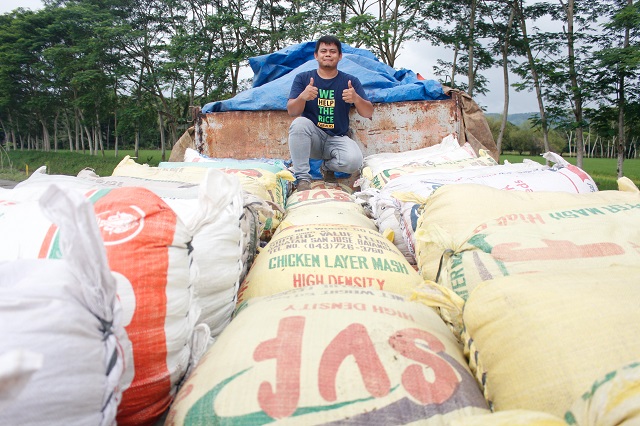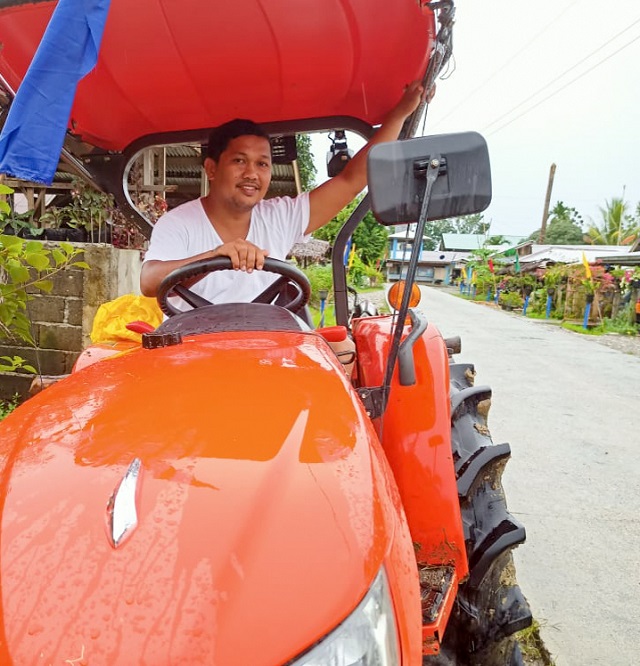
Leo Franco L. Ebardo’s net income goes as high as P400,000 per cropping season from his 5-ha farm.
Owing to production challenges, such as unstable prices and climate-related stresses, many farmers might have been contemplating on leaving rice farming. But for Leo Franco L. Ebardo of Bayugan City and Terencio R. Oquendo, Jr. of Esperanza, both in Agusan del Sur, their choice is to join this bumpy ride of producing more rice.
Truth to tell, they have joined the Esperanza Seed Growers-Farmers’ Association (ESEGFA), which was born in 2018 through DA-PhilRice’s Rice Business Innovations System (RiceBIS) Community Program that aims to transform farmers into agripreneurs.
Ready, set, plant!
RiceBIS Agusan started to take root in 2017 with the Dacutan Farmers’ Multi-purpose Cooperative (DAFAMCO). Project lead Sharen T. Rivas explained DAFAMCO was chosen as beneficiary because its business capabilities could still be improved despite its existence for many years.
“The Coop had unutilized assets like the rice milling machine provided by the government. Capitalizing on this, we introduced the milled rice business to the Coop. While we are not yet able to fully realize this owing to various circumstances, some clusters are already engaged in it,” Rivas narrated.
Looking at this business still from a distance, RiceBIS Agusan introduced another agroenterprise─ rice seed production and marketing. They trained capable farmers and invited even non-Coop members who were interested. In 2018, Leo and Terencio were separately invited to the training on seed production. That was the first time Terencio came to know about RiceBIS.
“I remember that because if not for RiceBIS, I would have continued sailing overseas. I wouldn’t be a seed grower now,” Terencio opened up.
Terencio, 34, was a seafarer for 8 years. Providentially, his first venture in seed production paid off and though he did not entirely plan to abandon the seas, rice seeds became his means to be with his family for good. His manning agency kept on calling him to go back overseas but he chose to continue his new-found job.
“As a seafarer, homesickness is inevitable. You just can’t help wishing you were with your family. That’s why I decided to stay with them for good and be a full-time rice farmer instead,” Terencio shared.
Leo, 29, is a graduate of BS in Computer Engineering and learned rice farming at an early age from his farmer-father. When his father had a heart attack in 2013, Leo and his younger brother took over their farm. While he did not get to practice his degree, what he learned from school came in handy in his farm management and record-keeping chores.
Leo admitted that he and his family had been wanting to become seed growers and RiceBIS helped make it happen.
“We asked the local agriculture office and we were instructed to join an association and wait for the next update. Eventually, we were informed about the training on seed production by RiceBIS,” Leo recalled.
After the training, Leo and Terencio, together with the participants who decided to become seed producers, deemed it necessary to create their own cooperative solely for seed production and marketing, thus ESEGFA was established with Terencio as the chairperson. Now, the association has 27 members and is set to be registered as a cooperative this year.
Becoming competitive

Terencio R. Oquendo became more competitive as he engaged in various agroenterprises, such as seed growing and machine servicing.
Terencio participates in RiceBIS activities because he wants to keep himself updated on the current trends in the rice industry. He learned to value-add and beat the low-palay-price fear.
“In RiceBIS, we are presented with opportunities for additional income. Effective marketing and future market prices are also forecasted like the effects of the Rice Tariffication Law enabling us to find ways to ease its impact,” Terencio disclosed.
Terencio also provides combine harvester services. He estimated that his income from machine servicing and growing and marketing rice seeds from his 11-ha farm now ranges P150,000-P183,000 per month compared with P70,000-P80,000 when he was still a seafarer.
Leo, on the other hand, confided that his net income goes as high as P400,000 per cropping season from his 5-ha farm.
During its first business cycle in the 2019 dry season, ESEGFA sold 521 bags of seeds at 40kg/bag amounting to P755,450. In the second and third cycles, it partnered with the Butuan Seed Producers Multi-Purpose Cooperative to supply seeds to the Rice Competitiveness Enhancement Fund (RCEF)-Seed Program, which provides free seeds to farmers. At 20kg/bag as required by RCEF, 9,742 bags were sold for the 2020DS and 9,775 bags for 2020WS seed distribution. This time, the association’s gross income reached P7,403,920 and P7,429,000, respectively.
Aside from market linkage, ESEGFA members also enjoy easier access to government programs and services. The Philippine Center for Postharvest Development and Mechanization (PhilMech), through RiceBIS, is set to grant the association with machines such as the combined harvester, rotovator, and mudboat. With this, ESEGFA plans on engaging in other enterprises to include use of machines for custom hiring, financing, and provision of farm inputs subsidy to its members.
To enhance business efficiency, RiceBIS also established a Farm Business School (FBS) for its farmer-cooperators in the first quarter of 2019.
“I learned how to integrate better business practices in rice production after attending the FBS. Before joining RiceBIS, I only sold fresh harvests. Now, I process them and fatten my profit. Aside from that, RiceBIS encouraged us to engage in other sources of income like vegetable production. For this, I allotted 0.75ha of my farm,” Leo shared.
Though the process required more work, Leo said the modern farming practices taught in the association, such as the use of high-quality seeds, right timing of fertilizer application, and proper diagnosis of diseases, gave him a 20% yield increase and 40% income increment.
“I became more competitive,” the computer engineer-turned farmer exclaimed.
Despite the many challenges, Leo and Terencio were grateful they had ever started their new journey with RiceBIS as seed producers. Though initially uncertain, for them, they never regret abandoning their would-have-been lucrative careers. [with reports from Perry Irish H. Duran]




